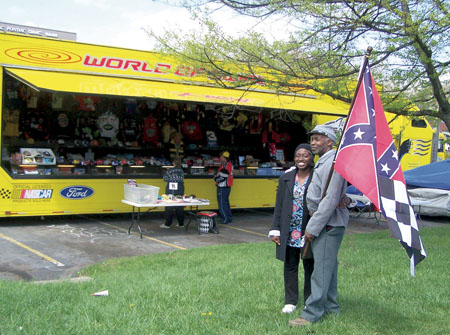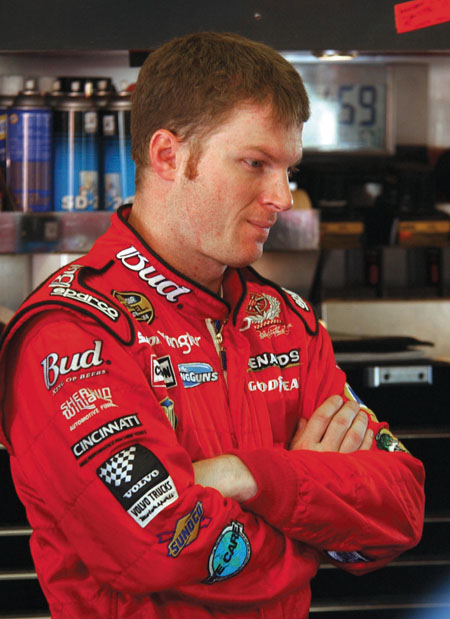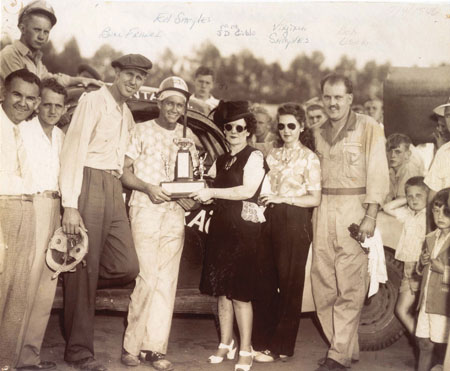H.K. Edgerton protests: Has NASCAR lost it roots?
by Bill Fishburne

H.K. Edgerton and a supporter at the NASCAR International Motorsports Hall of Fame hauler on Patton Ave.
ASHEVILLE – H.K. Edgerton, Asheville's foremost defender of the shared Southern bond between blacks and whites, was at it again last week as he picketed a NASCAR International Motorsports Hall of Fame hauler parked in front of a store on Patton Avenue.
Edgerton, a former president of the Asheville branch of the NAACP, says he marches and protests discrimination against the Southern heritage that he and his extended family share with their white brothers.
The cause of the most recent protest, Edgerton said, was comments made by NASCAR officials and their most popular driver, Dale Earnhardt, Jr., regarding "rednecks" and the Confederate flag.

Dale Earnhardt, Jr., in 2007. Although he is NASCAR's most popular driver, he no longer drives for his stepmother, Teresa Earnhardt and Budweiser, switching instead to a Chevrolet owned by Hendricks Motorsports.
Darryl Starnes of Mechanicsville, Va., is the national Chief of Heritage Defense for the Sons of Confederate Veterans. To Starnes, many of NASCAR's actions have been taken to minimize the Southern image of the nation's most popular sanctioning body and have ended up hurting the sport's popularity as well as race attendance.
"NASCAR said they wanted to get away from their redneck roots," Starnes says, "then Dale Earnhardt, Jr., made a remark that anyone who flew the Confederate flag was "ignorant". Many SCV members and supporters are NASCAR fans."

Bill France, Sr., stands beside Ed Samples as he receives the winner's trophy at a pre-NASCAR race on July 4, 1946. France, Sr., often drove in his own races in order to fill the field and to make a little extra money. NASCAR was formed in 1947 and France retired from driving to become the full-time president of the organization.
NASCAR Chairman and CEO Brian France, grandson of founder Bill France, Sr., apparently started the issue when he told CBS reporter Leslie Stahl, in a "60 Minutes" interview in 2005, that with regard to spectators flying the Confederate flag in the infield, "I think it's a fading image," France said. "Well, look. I can't – these are massive facilities. And I can't tell people what flag to fly. I can tell you the flag we get behind. It's the American flag."
According to a CBS transcript of the Oct. 6, 2005 interview, "France would love to tell fans not to fly the Confederate flag if he could. ‘It's not a flag I look at with anything favorable. That's for sure.'"
Starnes recognizes that SCV efforts alone won't change NASCAR's corporate mind, but he recounts with glee the response they had last year when they attended five NASCAR races and passed out thousands of Confederate battle flags with borders trimmed with black and white checks, as in a checkered flag.
"We started giving away confederate flags with checkered flag borders to races. We did it a Talladega, Bristol, Atlanta, Richmond and Darlington. We got excellent reception from fans. We had a plane at the tracks trailing a large Confederate flag and a banner that said, "NASCAR don't forget your roots". Entire grandstands would stand up and cheer as it came over their section of the racetrack. It was very well received. After we gave them all away fans deluged us to get one. After the races it continued, people really wanted the flag."
With some degree of satisfaction in his voice, Starnes said, "We have noticed that NASCAR attendance has fallen off. NASCAR has said attendance has been off, and the organization would go more slowly in their changes."
Regarding plans for the future, Starnes said, "We have one more race event planned, possibly more in the future, depending on NASCAR's attitude. We have never tried to sell anything at NASCAR tracks, we've just given them away, always outside the tracks. There hasn't been a full-fledged test of NASCAR's intent regarding the Confederate flag.
NASCAR President Mike Helton used the "redneck" word at a press conference in Washington, DC, in February of 2006 when he told reporters that "the old Southeastern redneck heritage that we had is no longer in existence."
Helton, a native of Bristol, Tenn., made the remarks at a Capitol Hill press conference extolling NASCAR's efforts to generate diversity in the sport. The sanctioning body had been pressured by Jesse Jackson and other civil rights activists.
Helton later clarified and partially retracted his remarks, saying he had used the "Southern redneck" phrase in his comment because he was repeating the question thrown at him by a reporter. "It was a mistake to repeat the phrase he used," Helton said.
Speaking before the Daytona 500 later that month (Feb. 2006), Helton went on to say, "NASCAR is absolutely as concerned about keeping its roots intact as it is about growing the sport. We're as proud of our heritage in 1948 as we are in 2006. At the same time, we're working to broaden the opportunities of the sport to anybody that wants to be a part of it and also broaden the exposure of the sport internationally."
The problem Helton faced then and now, is the perception that in expanding its racing around the nation it has at least walked, if not run, away from its Southern roots.
Those roots go deep into the Southern "redneck" culture and weave throughout the South, from Alabama to Georgia, North Carolina and Virginia, from Birmingham to Dawsonville, to Weaverville, Martinsville and the capital of the old Confederacy, Richmond, Va.
Weaverville resident Neal Thompson, a New Jersey transplant, chronicled NASCAR's origins in his 2006 book, "Driving With the Devil". The book traced the origins of NASCAR as a weekend hobby for moonshiners in the 1930's through the early days of racing on the sand at Daytona Beach. Thompson paid tribute to all the early pioneers, as he should, but focused the spotlight of publicity on the liquor-running background they almost all shared, and kept it there from cover to cover.
Regarding the Earnhardt family, Thompson wrote, "My view is that the Earnhardt family, but especially the Intimidator, represents the outlaw spirit that helped create NASCAR in the first place. Dale Sr. Was the modern incarnation of Lloyd Seay, Red Byron, Curtis Turner, and especially Roy Hall. Born and raised in the South, Earnhardt had dropped out of school to work at the local mill. But he managed to escape the drab life of his peers because he learned to tame the V-8 beast.
"When he died – and partly because he died, and NASCAR became national news – NASCAR continued its explosive growth as America's sport. NASCAR fans are wildly attracted to their visceral, animal, sexual romp of power and noise, all oomph and brightly painted cars bumping, nudging, and scraping in a high-speed dance. As one modern NASCAR observer said, "Fans get a few beers in ‘em , the Dixie comes out."
Few writers other than Tom Wolfe in his 1964 Esquire article, "The Last American Hero" have covered the sports pioneers so well. The late Bill Neely and Bob Ottum did the sport justice in "Stand On It", written under the pseudonym of Stroker Ace because Neely at the time was in charge of public relations for a major NASCAR sponsor, Goodyear Tire and Rubber Company. That book focused on the hell raising off-track lifestyle lived by the sports stars, primarily in the 1960's. At that point, NASCAR was a big deal but few if any of the participants had any idea where it was going.
The image of sunburned young Southern boys and girls waving Confederate flags is fine at Darlington or Charlotte, but doesn't bode well for the sport in boardrooms in New York, Chicago, and especially, Los Angeles. Or on television.
Especially not on television. One traditional race, the early May Rebel 500 at Darlington, was placed on the calendar on the traditional Confederate Memorial Day. In honor of that date, a man dressed as a Confederate Soldier would ride in the pre-race parade carrying a large Confederate battle flag.
As NASCAR has sanitized its image, that tradition has been discontinued. Darlington's Labor Day Southern 500 race date has been moved to California, and not all NASCAR races are sold out anymore. Cause and effect? Who knows, but there may be an even heavier price to pay when the current NASCAR-ABC/ESPN TV contract expires in 2014.
Meanwhile, both NASCAR and H.K. Edgerton march on. Edgerton does it alone, or with a few SCV supporters, living on donations to the cause. NASCAR, with its $4.8 billion TV contract plus billions more in revenue ranging from a $750 million Sprint sponsorship package to a slice of all the official NASCAR concessions, is in no danger of going out of business. At least, not anytime soon.
The contest is clearly unequal but the honor of what Edgerton's efforts is enduring. Long after NASCAR is gone and forgotten, the spirit, dedication and courage of the Confederate soldier in the 1860's, as honored by Edgerton and his supporters in the Sons of Confederate Veterans, will still be remembered.
##
Bill Fishburne is the Tribune Senior Editor.